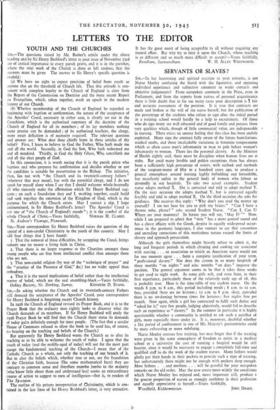SERVANTS OR SLAVES?
Sta,—In her heartening and spirited reaction to your remarks, is not Nurse Morley confusing the literal with the figurative, and opposing individual experience and subjective comment to wider contacts and objective judgements? From outspoken comment in the Press, even in Parliament, and from the reports from nurses of personal acquaintance there is little doubt that in far too many cases your description is fair and accurate assessment of the position. It is true that contracts are made and broken at the will of the nurse herself, but the publication of the percentage of the students who refuse to sign after the initial period in a training school would hardly be a help to recruitment. Of those who do sign many are well educated and of good family and possess those very qualities which, though of little commercial value, are indispensable in nursing. There exists an uneasy feeling that this class has been unduly exploited. Many sign the contract fully aware of the future humiliations, studied snubs, and those incalculable variations in feminine temperament which so often cause man's inhumanity to man to pale before woman's inhumanity to woman. There lies the personal slavery. As the Minister of Health rightly said, there must be discipline when human lives are at stake. But amid many lovable and golden exceptions there has always been a sufficiently high percentage of sisters, with outlook and methods of the sergeant-major of fifty to a hundred years ago, to produce a general atmosphere around nursing highly _forbidding and formidable, but manifestly unfair to the general body of women who labour so devotedly in our hospitals. To take two actual examples. Student nurse adopts method X. She is corrected and told to adopt method Y. On the next occasion she adopts method Y, but is corrected equally forcibly and told to adopt method X. On the third occasion she asks for guidance. She receives this reply: "Why don't you read the matter up yourself? I am not here for you to pick my brains." "Can I have a theatre robe, please?" asks second Student Nurse. "Can I, Can I? Where are your manners? In future you will say, May I? ' " Now, while I am prepared to admit that "may" has a more genteel sound and has a closer affinity with the Greek, despite its equally widespread occur- rence in the germanic languages, I also venture to say that censorious and unending corrections of this meticulous nature exceed the limits of slavery and approach persecution.
Although the girls themselves might bravely refuse to admit it, the long and frequent periods in which cleaning and cooking are associated with nursing . . . an association to which an American nurse would not for one moment agree . . . form a complete justification of your term, "professional slavery." Nor does the system in so many hospitals of three months "on nights" and nine months "on days" improve the position. The general argument seems to be that it takes three weeks to get used to night work. As some girls wilt, and even faint, in their first experience, particularly those of the relatively early age of z8, this is probably true. Here is the time-table of one student nurse. On the wards 8 p.m. to 8 a.m., this period including meals ; 8 a.m. to 12 a.m. free, provided there are no lectures ; 12 a.m. to 8 p.m. sleep, provided there is no awakening between times for lectures ; five nights free per month. Now again, while a girl has contracted to fulfil such duties• and "asked for it," very few people, judging objectively, would fail to describe such an experience as "slavery." In the summer in particular it is highly questionable whether a community is entitled to ask such a sacrifice of girls, more especially those under 21. It is, moreover, doubtful whether a like period of confinement in one of His Majesty's penitentiaries could be more exhausting or more subduing.
Nurse Morley stresses free training, but may forget that if the training were given in the same atmosphere of freedom as exists in a medical school or a university the cost of running a hospital would be still heavier, since it would be necessary to engage a completely full-time and qualified staff to do the work of the student nurses. Many fathers would gladly put their hands in their pockets to provide such a type of training, but unfortunately there might not be enough with pockets deep enough. Most fathers . . and mothers . . . will be grateful for your outspoken remarks on the old order. May the new create more widely the conditions which Nurse Morley has enjoyed and, more important still, produce a far greater proportion of nurses as strongly confident in their profession and equally appreciative as herself.—Yours faithfully,






























 Previous page
Previous page